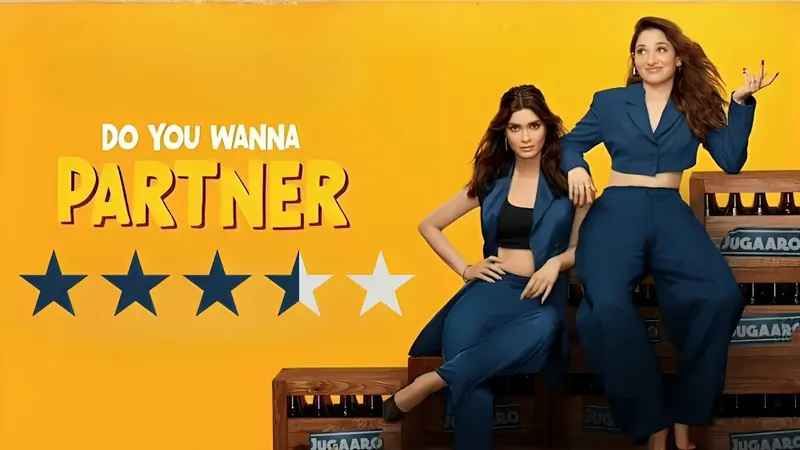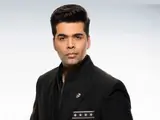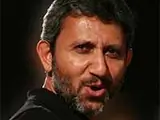‘Do You Wanna Partner’ Review: A frothy tale that goes down smooth with a tipsy kick for the weekend
Two best friends launch a craft beer start-up, facing friendship tests, quirky challenges, and business hurdles, delivering a grounded, fun, and engaging story for viewers.
Published: Thursday,Sep 11, 2025 18:30 PM GMT+05:30

Director: Archit Kumar, Collin D’Cunha
Produced by: Karan Johar, Adar Poonawalla, Apoorva Mehta
Cast: Tamannaah Bhatia, Diana Penty, Jaaved Jaafery, Nakuul Mehta, Shweta Tiwari, Neeraj Kabi, Sufi Motiwala, Rannvijay Singha & others
Where to Watch: Amazon Prime
Rating: (3.5/5)
‘Do You Wanna Partner’ arrives with a concept not often explored in Hindi storytelling: two women stepping into the alcohol business in India. Created under Karan Johar’s Dharmatic Entertainment, in association with Adar Poonawalla and Apoorva Mehta, the series is directed by Archit Kumar and Collin D’Cunha. At its centre are Tamannaah Bhatia and Diana Penty as Shikha and Anahita, childhood friends trying to convert a dream into a real enterprise.
The cast also includes Jaaved Jaafery, Nakuul Mehta, Shweta Tiwari, Neeraj Kabi, Sufi Motiwala, and Rannvijay Singha. Together, they build an ensemble that balances humour, conflict, and family dynamics, while the narrative maintains focus on friendship and entrepreneurship.
A New Entry in Hindi Web Series

The premise is simple: two best friends decide to set up their own craft beer company. Shikha carries her late father’s unfulfilled ambition of brewing beer, while Anahita, a finance professional, faces a sudden career setback that pushes her towards this unconventional venture. Their paths merge in a shared goal: creating space for women in a male-dominated business.
Across eight episodes, the show explores the mechanics of building a start-up—funding, branding, investors, and internal clashes. Yet the core is not about profits but about the messy, layered bond between two people whose differences both drive and test their partnership.
Themes and Approach

The central theme is entrepreneurship led by women. But instead of reducing it to inspiration, the series dives into challenges: access to capital, navigating bureaucracy, handling betrayals, and negotiating gender bias.
Another strong theme is friendship. Shikha and Anahita are opposites one emotional, one rational. Their partnership reflects how personal differences can strengthen or destabilise a business. The writing does not sugarcoat conflict. Arguments feel raw, especially when loyalty and ambition clash.
Family also shapes the narrative. Shikha’s bond with her late father drives her mission, while Anahita’s sibling relationship with Sufi brings both comic relief and genuine support. These subplots prevent the story from becoming just a start-up drama.
How the Series Plays Out

The show begins with the basics: brainstorming ideas, seeking funds, and convincing skeptical investors. The early episodes focus on seed capital struggles, branding discussions, and initial failures. Instead of glamourising start-ups, the series presents the grind bureaucratic paperwork, endless pitching, and the toll it takes on personal relationships.
Midway, the narrative shifts towards conflicts between the two leads. Their contrasting approaches to Shikha's instinctive marketing tactics versus Anahita’s structured financial calculations create fractures. These differences mirror real-life partnerships, where friendship often gets tested by business decisions.
The latter half balances tension with moments of humour. Supporting characters like Dylan and Sufi lighten the mood while keeping the focus on the central journey. Shweta Tiwari’s entry as an industry heavyweight adds fresh conflict, reminding the protagonists that success demands not only hard work but resilience against systemic power.
The finale ties together personal and professional arcs. Betrayals, reconciliations, and final choices define where the friends land not just in business but in their understanding of each other. The ending avoids unnecessary melodrama, closing on a note of growth and clarity.
Performances

Tamannaah Bhatia anchors the series with energy. Her portrayal of Shikha captures both impulsiveness and guilt, making the character believable. Diana Penty offers restraint as Anahita, playing off Tamannaah’s fiery persona with balance. Together, their dynamic carries the narrative forward.
Supporting performances stand out in bursts. Jaaved Jaafery adds charm with his layered eccentricity. Nakuul Mehta experiments with quirk, showing a controlled descent into obsession. Shweta Tiwari’s screen presence brings weight to the antagonistic role. Rannvijay Singha provides warmth as a stable counterpart to Shikha’s turbulence. Sufi Motiwala’s self-portrayal is risky but effective, injecting authenticity and humour.
Direction and Execution

Directors Archit Kumar and Collin D’Cunha keep the pace brisk. Episodes do not drag, and emotional beats do not stretch beyond necessity. The camera captures boardrooms, family homes, and brewery setups with clarity, giving each space its own mood.
The writing balances lightness with tension. Dialogues stay conversational, never slipping into preachy territory. Instead of glamorising start-up culture, the series portrays the hustle in a grounded way unpredictable, messy, and emotionally draining.
Cultural Relevance

The idea of two women running a beer start-up resonates with current shifts in India, where female entrepreneurs are slowly challenging stereotypes. The series highlights gender bias without making it the only subject. It treats entrepreneurship as both a professional and emotional journey.
By choosing craft beer a product still finding mainstream acceptance in India the narrative also touches on generational shifts in consumption and aspiration. The setting is urban but relatable, reflecting the push and pull between tradition and modern ambition.
Final Take
‘Do You Wanna Partner’ succeeds in combining entertainment with commentary. It does not preach about women empowerment, but it shows it in action through negotiations, failures, and resilience. At the same time, it offers humour, sibling banter, romance, and friendship conflicts that make it accessible beyond just start-up enthusiasts.
With eight tightly packed episodes, the series avoids unnecessary stretching. The balance of professional drama and personal emotion ensures viewers remain invested.
The show may not revolutionise Hindi web content, but it fills a unique space: a friendship-led entrepreneurial story that is neither preachy nor shallow.
Poll
Are you planning to watch Do Yoh Wanna Partner this weekend?
Join Our WhatsApp Channel
Stay updated with the latest news, gossip, and hot discussions. Be a part of our WhatsApp family now!
Join NowYour reaction
 Nice
Nice Great
Great Loved
Loved LOL
LOL OMG
OMG Cry
Cry Fail
Fail


























Post a comment